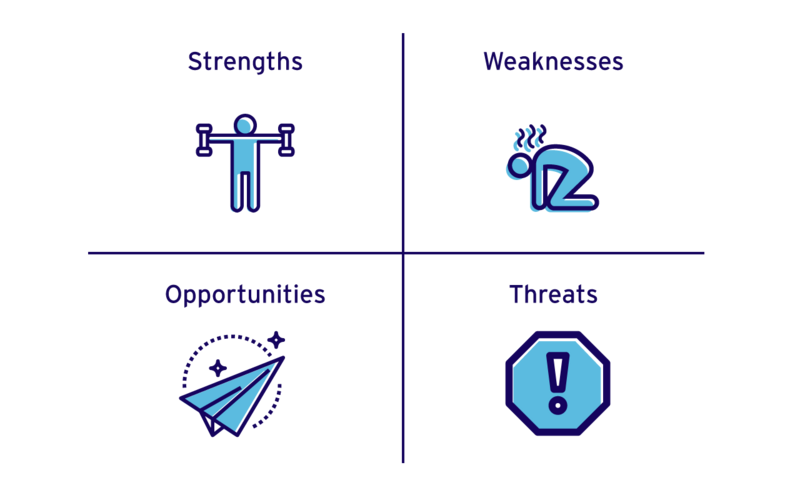Competitor analysis framework helps you conduct proper detailed research about your business rivals.
Here’s the thing: if you want to have a killer market analysis, you need a solid and well-organised framework.

Think about it for a moment. You can outdo all of your rivals if you employ the right scheme and study the market dynamics well.
Want to know more about market analysis frameworks? Let’s get down to it!
Why you need to conduct competitor analysis
When you’re planning to enter a new market, you should know the potential rivals who are already in the game.
They have probably already grabbed a main part of the market share. And you want to strengthen your position and perform better than your opponents. But how?
As an ambitious entrepreneur, you first need to study your rivals’ businesses and sales strategies.
And it doesn’t stop there. Based on benchmarking analysis, you can build a reliable market strategy and find ways of performing better than your competitors.
Let’s dig a little deeper and see how a competitor analysis can be helpful.

Understand market conditions
It would be great to identify the market leaders at the beginning of the study. Moreover, you have to review their best products or services to understand market conditions better.
Also, pay attention to the target keywords while studying your competitors’ offerings. Keywords precisely describing the products that both you and your opponents offer are worth keeping an eye on.
Want to know the best part? In my own experience, knowing market conditions will pave the way for applying the competitor analysis framework.
Analyse competitors’ sales and marketing strategies
While running a market study, it’s crucial to analyse the rivals’ business strategies. I’ll briefly walk you through the process.
First, you should explore the channels through which others sell their products or services.

Let’s say your competitor runs an ecommerce business. In this case, gathering data about its website, mapping, and tracking tools would be very useful.
Moreover, studying the rivals’ pricing and discount policies would give you great tips about sales plans.
Have a look at competitors’ social media usage
Your market research should also shed light on rivals’ social media strategies.
Consider the following questions: Which social networks do your competitors use? What types of content are the most popular ones in your market?
Let’s say your product isn’t suitable for selling on a website. And your competitors promote the same product via Instagram stories.
It means that both your opponents and potential customers deem Instagram stories the most user-friendly and convenient way of communication.

Think about it for a moment:
By analysing your competitors, you can employ the best social media techniques and benefit from them. And they’ll build great communication between you and your customers.
Therefore, it’s worth studying social media trends in the market. Also, pay attention to the frequency of post and content sharing.
And the good news?
All the data you’ll gather during your market study will help create the competitor analysis framework.
Time to employ a competitor analysis framework
Picture this: You’ve done thorough and perfectly detailed research. And you know what your opponents are up to.
But you don’t know how to draw practical conclusions from your research and compare your business with its competitors. We’ve all been there.
Here’s the thing:
The competitor analysis framework will help you to organise the data you collected about current market conditions.
Want to see how it works? Let’s look at one of the competitive analysis example schemes and see how it’ll help you.
SWOT analysis framework
The name of this competitor analysis framework stands for strengths, weaknesses, opportunities, and threats. SWOT analysis is a part of a broader competitive landscape framework.
This technique will teach you how to assess your business plan and what aspects to consider while entering a new market.

SWOT will provide you with a clear sense of the differences between you and your competitors. Most importantly, you’ll know how to craft a killer market strategy.
Thanks to SWOT, you’ll be able to analyse your brand strategies from four perspectives. So let’s have a closer look at the aspects of SWOT.
Strengths and weaknesses
This part of the scheme will help you understand your brand’s competitive advantages. Strengths are product and company features that make you unique compared to your rivals.
What do you offer better than them? What makes you special? Also, why should the customers buy your products or services instead of others in the market?
For example, a well-known brand reputation and high-quality product can be your company’s strengths. But wait… it doesn’t stop there.
As a new player in the market, you indeed do have some weaknesses. Let’s say you have a much less market share than your competitors. And the reason is that you’ve just begun operating in the sector.
Or you may have unreliable cash inflow at the early stages of operations. A more detailed list of strengths and weaknesses will ensure the reliability of the market analysis.

Opportunities and threats
As a business owner, you’re in a never-ending battle. And you have to keep an eye on what might happen in the future to your business.
You can spot many factors related to the future as opportunities. Progress in market conditions and technological advances can sometimes be predictable.
Political and social factors may create opportunities in the market where you’re operating. Let’s say the local government may introduce new laws for the future that’ll hugely encourage you to expand your activity area.
And that’s just one side of the story.
You should also consider future challenges and threats that may harm your operations.
Upcoming technological and political changes may be tough to adapt to. Other brands may affect quality standards by improving their sales and marketing campaigns.
So what it’s all about?
A superb competitor analysis framework such as SWOT will help you discover and build on your strengths. You’ll feel ready to grab opportunities, perform better than your competitors, and boost your business income!
Kamran Shukurlu
Kamran is a T-shaped eCommerce Digital Marketer and Content Strategist with 9+ years of experience in 30+ industries. A few of the companies that benefited from his services: Leo Burnett, Translated, Airbnb, Samsung, Huawei, etc.
Related Posts
March 1, 2021
Monthly Social Media Updates And News: January 2021
February 21, 2021
How To Get Unlimited Free Leads For Any Business In UK
February 20, 2021
How to Find Brands That Collaborate With Small Influencers
February 4, 2021
Web Content Development 101 For Small Businesses
January 28, 2021
Monthly Social Media Updates and News: December 2020
January 13, 2021
How To Add A Link To Instagram Story Without 10K Followers
December 14, 2020
6 Testimonial Examples And How To Ask For Them
December 11, 2020
IG Line Break Generator: No Need For it Anymore? (2022)
December 2, 2020











